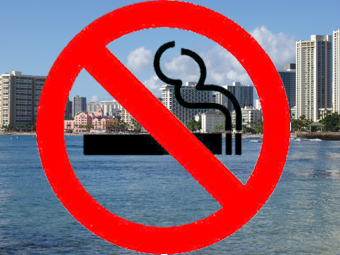
photo and composition by Lisa Whitten
Hawaii Raises Legal Age for Tobacco
| published December 30, 2015 |
By Thursday Review staff
Though more than a dozen U.S. states have considered legislation to make it harder for young people to have access to cigarettes, one state has taken a dramatic step to ban smoking altogether for people under the age of 21.
This week, Hawaii became the first state to raise the legal age to smoke to 21. The new Hawaii law will cover traditional smoking products as well as all forms of electronic cigarettes and vapor cigs. Other states will now be closely watching how the change affects smoking rates in the Aloha State, and how the new legal age impacts the health of younger people.
Most U.S. states have established the legal age for smoking at 18. Four states—Utah, Alabama, New Jersey and Alaska—have a minimum age for smoking set at 19. Hawaii becomes the first to raise the tobacco bar to 21, a change which will no doubt spark complaints by some young people—especially college students—but one long advocated by health organizations and medical groups.
Electronic cigarettes and vapor products have been included in Hawaii’s legislation in part because the Aloha State has the nation’s highest rate of e-cigarette consumption among all age groups, and its rate of teen usage of vapor products is three times the national average, according to a major study by the University of Hawaii’s Cancer Research Center.
A ban on e-cigarettes in certain public spaces had already been implemented on the Big Island, where early in 2015 it became illegal to use vapor products on beaches, inside restaurants, in most shopping centers and malls, any public building, and—in fact—anyplace where traditional tobacco smoking is already banned. But politicians on the Big Island were also pushing to raise the minimum age for any smoking to 21, one of several similar legislative efforts statewide. According to some studies, use of e-cigs by teens on the Big Island was even higher than that of the rest of the state.
The statewide law raising the age for any form of smoking to 21 was meant to simplifier and unify the legislation, and make it easier for police to enforce.
Once the new laws are in effect, first violations by an individual will spur a small fine—only $10. Second and third violations will bring about a heftier $50 fine. Any store owner or retail establishment caught selling cigarettes or vapor products to a person under the age of 21 will be hit with a minimum $500 fine, and multiple violations could trigger business license revocation or prosecution by police.
Other states considering raising the minimum age for smoking to 21 are Massachusetts and California. In the California Senate, a bill has already passed doing precisely that—but it awaits approval by the governor and the courts. California’s argument is simple: by nipping interest in smoking earlier, and maintaining that legal age limit until age 21—fewer Californians will take up smoking, period. The effect will be billions of dollars saved in health care costs and in insurance costs.
Decades of major medical studies in the U.S. and in other countries show that those who pick up smoking early in their lives often smoke consistently for decades. The idea in Hawaii, according to legislators who supported the change, is to create a disincentive to younger smokers so that those health costs do not balloon in the coming decades.
Related Thursday Review articles:
Ohio Rejects Marijuana Legalization; Thursday Review staff; Thursday Review; November 4, 2015.
Florida’s Anti-Tobacco Verdict; Earl Perkins; Thursday Review; July 23, 2014.
